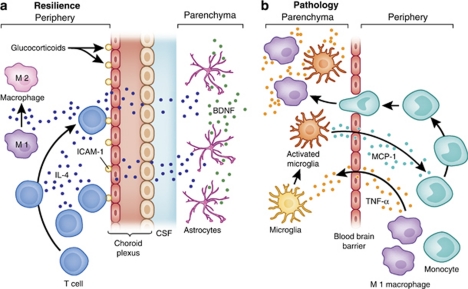Figure 1.
Immune cell trafficking in CNS resilience and pathology. Immune cell trafficking to the brain can have important roles in mental health and illness, including (a) the delivery of anti-inflammatory molecules that can promote neuronal integrity and resilience, and (b) the communication of inflammatory signals, which may contribute to pathology. For example, (a) during stress, the production of glucocorticoids increases the expression of ICAM-1 by choroid plexus cells, which then attracts CD4+ T cells to the brain. Production of IL-4 by these T cells has been shown to shift the phenotype of meningeal myeloid cells (eg, macrophages) from an M1 (or proinflammatory) phenotype to an M2 (or anti-inflammatory) phenotype. In addition, IL-4, which enters the circulation or the CSF, can diffuse into brain parenchyma and induce glial elements, including astrocytes, to produce BDNF, which promotes neurogenesis and synaptic plasticity. By contrast, (b) peripherally elaborated TNF-α can lead to the activation of microglia, which in turn produce the chemokine, MCP-1. MCP-1 attracts monocytes to the brain where they enter the brain parenchyma as activated macrophages, capable of producing TNF-α as well as additional inflammatory mediators such as other inflammatory cytokines and reactive nitrogen and oxygen species.

